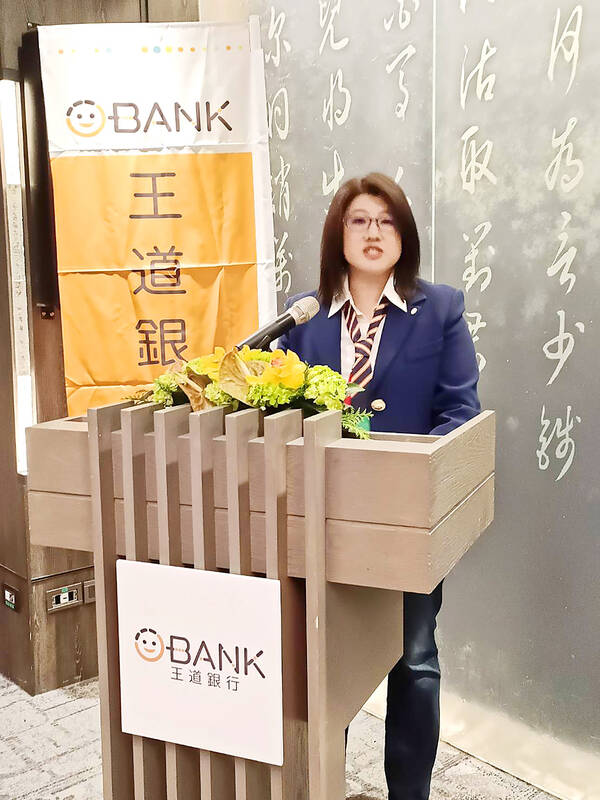O-Bank Co Ltd (王道商業銀行), the nation’s first online bank, is pursuing double-digit percentage growth in core businesses this year on top of last year’s record earnings, undeterred by lingering economic uncertainty, top-ranking officials said yesterday.
O-Bank is optimistic about fee and interest income growth, as well as wealth management and foreign-exchange gains, driven by a strategy focusing on lending with affiliates of major Taiwanese corporations, bank president Elton Lee (李芳遠) said.
Conducting business with corporate clients generates higher margin despite a lack of financial protection from their parent companies, Lee said.

Photo: Lee Chin-hui, Taipei Times
O-Bank considers risk controls essential, as evidenced by its improving return on equity to 13.59 percent and return on assets to 1.5 percent last year, he said.
The “bad loan” ratio stood at a low 0.35 percent, and non-performing loan coverage ratios reached 431.51 percent, affirming healthy asset quality, Lee said.
Pre-tax profit in the first two months of this year totaled NT$950 million (US$30.99 million), rising 10.6 percent from the same period last year and ahead of expectations, Lee said.
The figures showed earnings per share rising 18.75 percent year-on-year to NT$0.19, indicating that the bank “stayed on the right track” and grew more profitable three years after new leadership, said O-Bank chairwoman Tina Lo (駱怡君), who assumed her position in 2020.
The lender last year achieved record profit of NT$5.8 billion, supported by improving commercial and retail banking, along with a merger of its IBT International Leasing Corp (台駿租賃) with Jih Sun International Leasing & Finance Co (日盛台駿租賃), Lo said.
O-Bank has a 44.5 percent stake in Jih Sun and would distribute profit proportionately, she said.
When not including the merger benefit, net income at O-Bank last year would have increased 9 percent to NT$2 billion, better than transforming to a commercial bank, Lo said.
The bank aims to add more than 100 employees to its payroll this year to meet expansion needs at its corporate and retail banking businesses, she said.
O-Bank plans to distribute cash dividend this year similar to last year's level at NT$0.3 per share but the board has not reached a decision on the matter yet, Lo said. Like most other peers, O-Bank lost NT$2.8 billion last year due to the global financial tumult.
Additionally, the online banking environment this year appears to be challenging, as stakeholders must increase their economic scale before seeking profit, Lee said.
Taiwan’s central bank is likely to slow or halt monetary tightening next week to allow economic growth, Lee said.
Other policy tools to fight inflation exist, and rate hikes should be the last resort, he added.

Taiwan Semiconductor Manufacturing Co (TSMC, 台積電) last week recorded an increase in the number of shareholders to the highest in almost eight months, despite its share price falling 3.38 percent from the previous week, Taiwan Stock Exchange data released on Saturday showed. As of Friday, TSMC had 1.88 million shareholders, the most since the week of April 25 and an increase of 31,870 from the previous week, the data showed. The number of shareholders jumped despite a drop of NT$50 (US$1.59), or 3.38 percent, in TSMC’s share price from a week earlier to NT$1,430, as investors took profits from their earlier gains

In a high-security Shenzhen laboratory, Chinese scientists have built what Washington has spent years trying to prevent: a prototype of a machine capable of producing the cutting-edge semiconductor chips that power artificial intelligence (AI), smartphones and weapons central to Western military dominance, Reuters has learned. Completed early this year and undergoing testing, the prototype fills nearly an entire factory floor. It was built by a team of former engineers from Dutch semiconductor giant ASML who reverse-engineered the company’s extreme ultraviolet lithography (EUV) machines, according to two people with knowledge of the project. EUV machines sit at the heart of a technological Cold

AI TALENT: No financial details were released about the deal, in which top Groq executives, including its CEO, would join Nvidia to help advance the technology Nvidia Corp has agreed to a licensing deal with artificial intelligence (AI) start-up Groq, furthering its investments in companies connected to the AI boom and gaining the right to add a new type of technology to its products. The world’s largest publicly traded company has paid for the right to use Groq’s technology and is to integrate its chip design into future products. Some of the start-up’s executives are leaving to join Nvidia to help with that effort, the companies said. Groq would continue as an independent company with a new chief executive, it said on Wednesday in a post on its Web

CHINA RIVAL: The chips are positioned to compete with Nvidia’s Hopper and Blackwell products and would enable clusters connecting more than 100,000 chips Moore Threads Technology Co (摩爾線程) introduced a new generation of chips aimed at reducing artificial intelligence (AI) developers’ dependence on Nvidia Corp’s hardware, just weeks after pulling off one of the most successful Chinese initial public offerings (IPOs) in years. “These products will significantly enhance world-class computing speed and capabilities that all developers aspire to,” Moore Threads CEO Zhang Jianzhong (張建中), a former Nvidia executive, said on Saturday at a company event in Beijing. “We hope they can meet the needs of more developers in China so that you no longer need to wait for advanced foreign products.” Chinese chipmakers are in